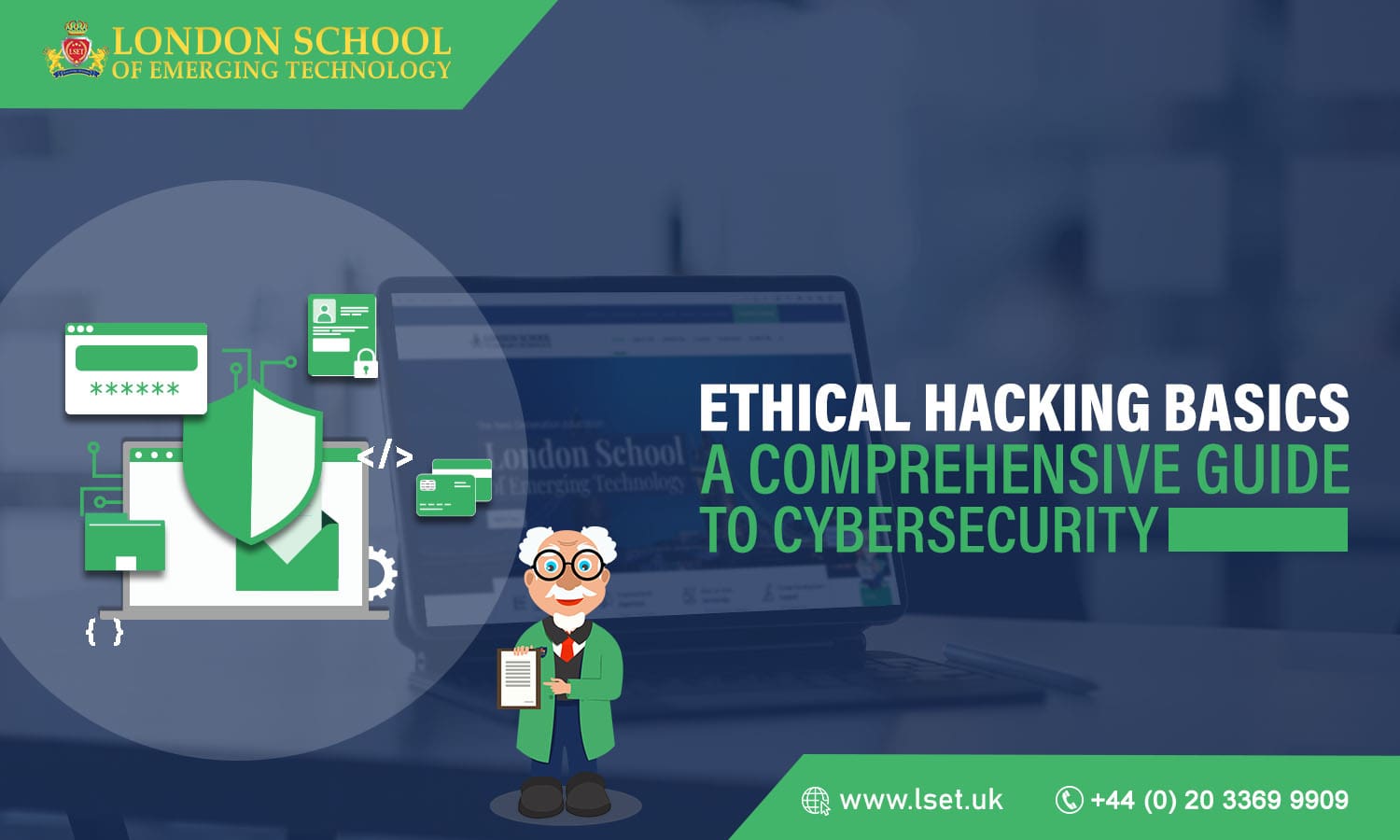Introduction to Ethical Hacking
In today’s digital age, cybersecurity has become a paramount concern for individuals, businesses, and governments. Confronted with the escalating risk of cyber threats, organisations consistently work to protect their sensitive data and strengthen their networks. Ethical hacking, often called white-hat hacking, is vital in cybersecurity. This thorough guide seeks to explore the essentials of ethical hacking. They emphasise its significance in cybersecurity, distinguishing it from malicious hacking, elucidating the involved processes, exploring the tools and techniques employed, outlining the steps towards becoming an ethical hacker, and presenting available certifications and resources.
What is Cybersecurity?
Cybersecurity protects computer systems, networks, and data from unauthorised access, theft, damage, or disruption. It involves a variety of measures and practices crafted to protect sensitive information and guarantee the integrity, confidentiality, and availability of digital assets.
In an interconnected world where data breaches and cyber-attacks are rising, cybersecurity has become a critical concern for businesses and individuals.
Why Ethical Hacking is Important for Cybersecurity
Ethical hacking plays a vital role in boosting cybersecurity. Ethical hackers help organisations identify vulnerabilities in their systems and networks by simulating real-world cyber-attacks. They adopt the mindset of malicious hackers to anticipate potential threats and weaknesses before they can be exploited. Ethical hackers enable organisations to patch security flaws by exposing these vulnerabilities, enhancing their resilience to cyber-attacks. Without ethical hacking, organisations would remain blind to these vulnerabilities, leaving them susceptible to malicious hackers.
The Difference between Ethical Hacking and Malicious Hacking
Ethical and malicious hacking are two sides of the same coin, differing primarily in intent and legality. As mentioned, ethical hackers work with the organisation’s consent to identify vulnerabilities and strengthen their security systems. They follow a rigorous code of conduct, ensuring their actions are legal, ethical, and within the boundaries defined by the organisation. Conversely, malicious hackers, commonly called black-hat hackers, operate without permission, seeking to exploit vulnerabilities for personal gain. Their actions are illegal and motivated by malicious intent, leading to data breaches, financial losses, and reputational damage.
The Ethical Hacking Process
Ethical hacking follows a structured process to identify vulnerabilities and assess an organisation’s security posture. This process typically involves several phases: reconnaissance, scanning, enumeration, vulnerability assessment, exploitation, post-exploitation, and reporting. Ethical hackers collect information about the target system during reconnaissance, including IP addresses, network topology, and potential entry points. In the scanning phase, they use various tools and techniques to identify open ports, services, and potential vulnerabilities. Enumeration entails collecting more detailed information about the target system, including user accounts, network shares, and system configurations. Vulnerability assessment aims to identify weaknesses that can be exploited, while exploitation involves attempting to gain unauthorised access to the system. The post-exploitation phase is focused on maintaining access and escalating privileges. Finally, ethical hackers compile a comprehensive report detailing their findings, recommendations, and remediation strategies.
Steps to Becoming an Ethical Hacker
Becoming an ethical hacker requires technical knowledge, practical experience, and moral understanding. Here are some steps to kickstart your journey: Develop a strong foundation in computer networks, operating systems, and programming languages.
Gain hands-on experience by setting up virtual lab environments and practising various hacking techniques.
Learn about different types of vulnerabilities, exploit frameworks and security tools. Stay informed about the most recent developments in cybersecurity, trends, and best practices.
Engage with the ethical hacking community, participate in forums and conferences, and collaborate with like-minded individuals. Obtain relevant certifications, such as Certified Ethical Hacker (CEH) or Offensive Security Certified Professional (OSCP), To substantiate your skills and bolster your professional credibility.
Conclusion
Ethical hacking is a crucial pillar of cybersecurity, enabling organisations to identify and address vulnerabilities in their systems and networks proactively. Ethical hackers play a vital role in strengthening. The digital landscape and safeguarding sensitive information by adopting the mindset of a malicious hacker. This comprehensive guide has offered insights into the fundamentals of ethical hacking, emphasising its significance in cybersecurity. It covers distinctions between moral and malicious hacking, the ethical hacking process, tools, techniques, steps to becoming an ethical hacker, certifications, courses, and available resources and communities. With this knowledge, individuals can enter the captivating realm of ethical hacking, actively contributing to a safer and more secure digital future. Dive into cybersecurity and ethical hacking with our comprehensive guide, ‘Ethical Hacking: A Beginner’s Guide to Cybersecurity.’ At the London School of Emerging Technology, we offer a specialised course tailored for beginners, providing essential knowledge and hands-on skills To begin an exploration into the thrilling realm of ethical hacking. The LSET program covers cybersecurity fundamentals, penetration testing techniques, and the ethical hacker’s role in securing digital lands.

